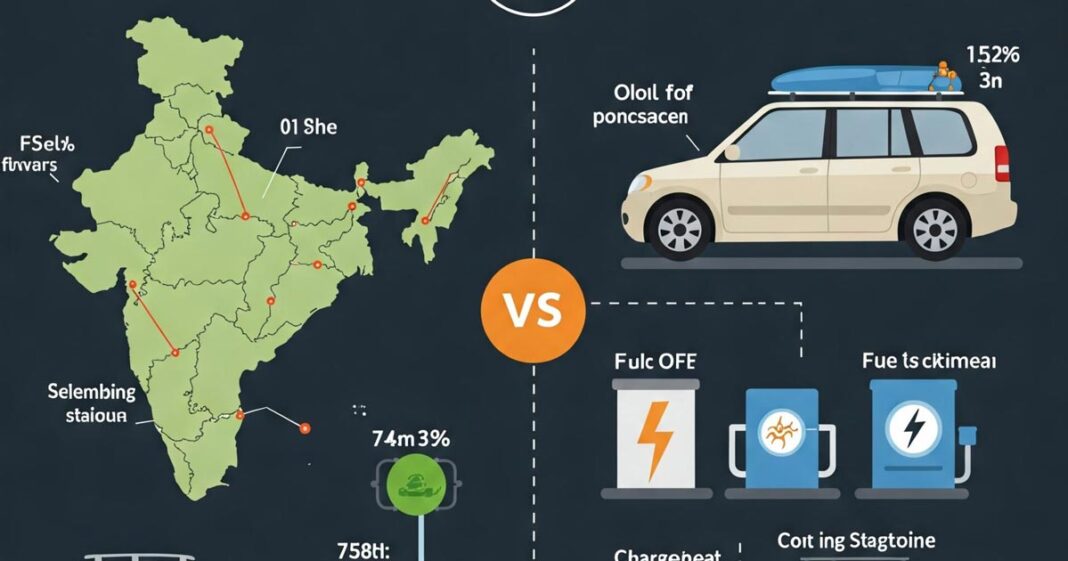
With the Indian automotive market rapidly shifting toward greener alternatives, Compressed Natural Gas (CNG) cars and Electric Vehicles (EVs) have gained tremendous popularity. While EVs promise zero emissions and futuristic technology, CNG cars continue to dominate the market due to their affordability, practicality, and established infrastructure. For Indian buyers weighing the pros and cons of both options, here’s a detailed comparison that highlights why CNG cars remain a smarter choice in 2025.
1. Cost-Effectiveness:
CNG Offers Lower Initial Investment One of the biggest factors influencing car-buying decisions in India is the initial cost of ownership. CNG variants of popular models typically cost only ₹60,000 to ₹1 lakh more than their petrol counterparts. Even with this additional investment, CNG cars remain far more affordable than EVs, which start at around ₹8 lakh to ₹10 lakh for entry-level models. The higher cost of electric cars is primarily due to expensive battery technology, making them less accessible to middle-class buyers. Verdict: CNG cars provide a budget-friendly alternative without compromising on fuel efficiency.
2. Widespread Infrastructure:
CNG Stations Lead the Way India’s CNG infrastructure is well-established, with over 5,500 CNG refueling stations spread across major cities and highways. This widespread network ensures that CNG car owners can easily refuel their vehicles without much hassle. In contrast, the EV charging network is still developing, with inadequate coverage in Tier 2 and Tier 3 cities. While the government is ramping up efforts to increase charging stations, the lack of fast-charging facilities makes owning an EV less convenient for many. Verdict: CNG cars are more practical for Indian roads, thanks to the readily available refueling infrastructure.
3. Refueling Time and Range:
CNG Eliminates Range Anxiety When it comes to range and refueling, CNG cars outperform EVs. A full CNG tank provides a range of 250-300 km, and refueling takes just 5-10 minutes, similar to petrol or diesel cars. EVs, however, require 40-60 minutes to charge up to 80% using a fast charger, while home charging can take 6-8 hours. Additionally, EVs still suffer from range anxiety, with most models offering a range of 200-400 km on a full charge. Verdict: CNG cars eliminate range anxiety and offer quick refueling, making them ideal for daily commutes and long-distance travel.
4. Lower Maintenance and Longevity
CNG cars are built on internal combustion engine (ICE) platforms, making their maintenance easier and cost-effective. Mechanics across India are familiar with CNG technology, ensuring hassle-free repairs and servicing. In contrast, EVs have fewer moving parts but rely on expensive lithium-ion batteries that need replacement after 6-8 years, often costing 40-50% of the vehicle’s value. Verdict: CNG cars have lower maintenance costs and longer lifespans, making them a safer bet for long-term ownership.
5. Eco-Friendliness:
CNG Reduces Emissions Without Battery Concerns While EVs boast zero tailpipe emissions, their environmental impact depends on how electricity is generated. Since India’s power grid is still heavily reliant on coal, the overall carbon footprint of EVs may not be as minimal as perceived. On the other hand, CNG cars emit 25% less CO₂ and 90% fewer nitrogen oxides compared to petrol and diesel cars, making them a cleaner and more immediate solution for reducing emissions. Verdict: CNG cars strike a balance between eco-friendliness and practicality, while EVs require cleaner energy sources to achieve their true environmental potential.
6. Ideal for Long-Distance Travel
Long-distance travel with EVs is still a challenge in India due to limited charging infrastructure along highways. Even with fast-charging stations, the time required to recharge an EV mid-journey adds considerable delays. CNG cars, on the other hand, offer reliable long-distance performance, with refueling stations available on highways and refueling taking just minutes. Verdict: For highway travelers and long-distance commuters, CNG cars offer superior convenience and peace of mind.
7. Immediate Savings on Fuel Costs
CNG cars significantly reduce running costs compared to petrol and diesel vehicles. On average, the cost per kilometer for a CNG vehicle is around ₹2.5 – ₹3/km, while petrol and
diesel cars cost almost double. Although EVs offer the lowest running cost at ₹1 – ₹1.5/km, the higher upfront investment in an EV means it takes years to break even and realize those cost benefits. Verdict: CNG cars provide immediate fuel cost savings without the long wait for cost recovery.
8. Longevity of Fuel Systems vs. EV Batteries
CNG kits and their associated systems have a lifespan of 10-12 years with minor maintenance. In contrast, EV batteries degrade over time and need replacement after 6-8 years, adding substantial costs to the vehicle’s lifespan. Battery degradation not only reduces range but also impacts the overall performance of the vehicle. Verdict: CNG systems are more durable and cost-effective over the vehicle’s lifetime. The Final Verdict: CNG Cars are Still a Smart Choice in 2025 While EVs undoubtedly represent the future of mobility, CNG cars remain a practical and cost-effective solution for Indian buyers in 2025. With lower initial costs, better infrastructure, faster refueling times, and immediate fuel savings, CNG cars continue to offer a more accessible and hassle-free experience for Indian consumers. Until India’s EV ecosystem matures with a cleaner energy grid and widespread charging infrastructure, CNG cars remain the ideal choice for environmentally conscious buyers looking for value, convenience, and long-term savings.





